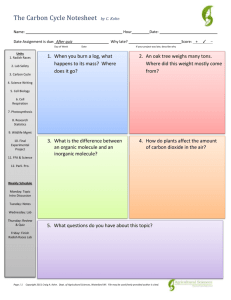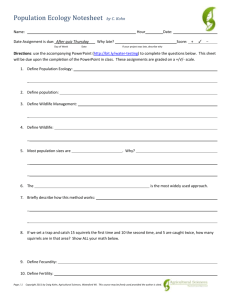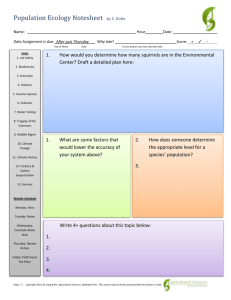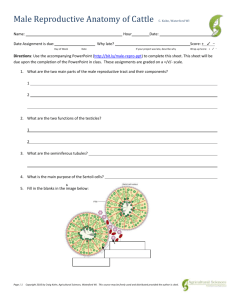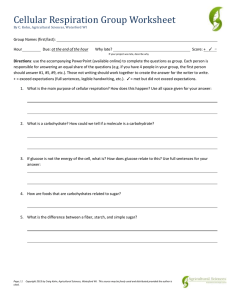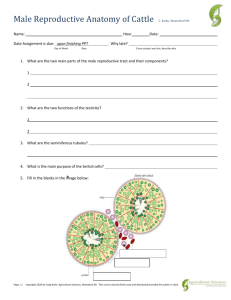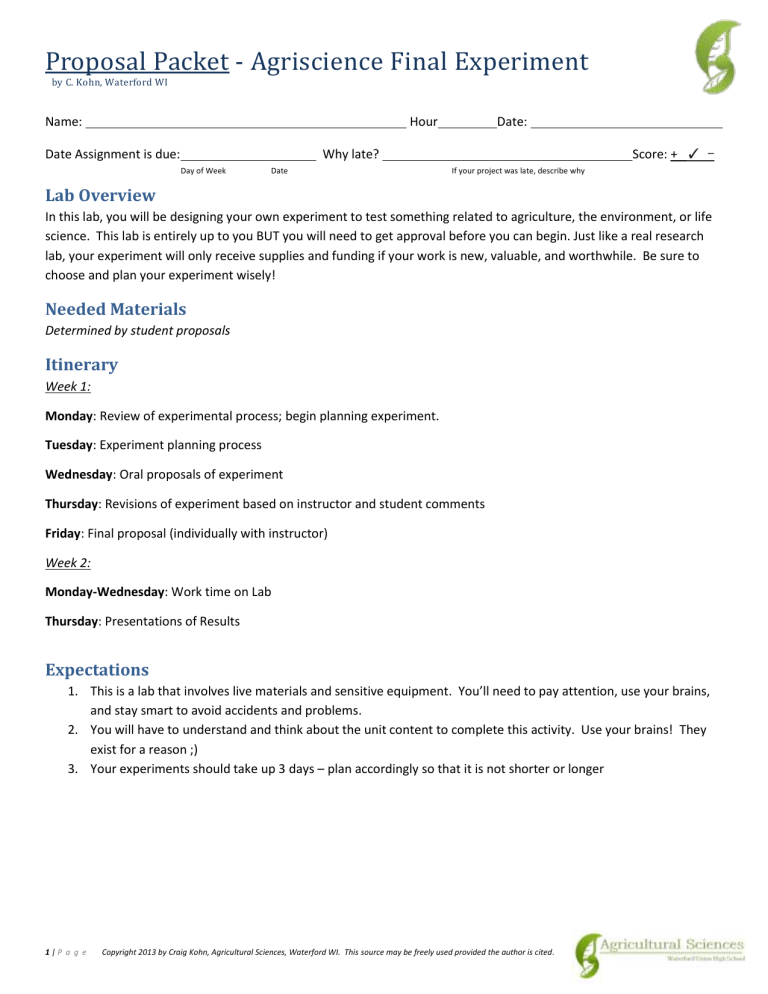
Proposal Packet - Agriscience Final Experiment by C. Kohn, Waterford WI Name: Hour Date Assignment is due: Date: Score: + ✓ - Why late? Day of Week Date If your project was late, describe why Lab Overview In this lab, you will be designing your own experiment to test something related to agriculture, the environment, or life science. This lab is entirely up to you BUT you will need to get approval before you can begin. Just like a real research lab, your experiment will only receive supplies and funding if your work is new, valuable, and worthwhile. Be sure to choose and plan your experiment wisely! Needed Materials Determined by student proposals Itinerary Week 1: Monday: Review of experimental process; begin planning experiment. Tuesday: Experiment planning process Wednesday: Oral proposals of experiment Thursday: Revisions of experiment based on instructor and student comments Friday: Final proposal (individually with instructor) Week 2: Monday-Wednesday: Work time on Lab Thursday: Presentations of Results Expectations 1. This is a lab that involves live materials and sensitive equipment. You’ll need to pay attention, use your brains, and stay smart to avoid accidents and problems. 2. You will have to understand and think about the unit content to complete this activity. Use your brains! They exist for a reason ;) 3. Your experiments should take up 3 days – plan accordingly so that it is not shorter or longer 1|P a g e Copyright 2013 by Craig Kohn, Agricultural Sciences, Waterford WI. This source may be freely used provided the author is cited. Day 1: Review of the Experimental Process Score Directions: use the hypothetical example below to write each component in the spaces below. A hypothetical Agriscience group wants to see if pigs that are fed a high protein diet will have a higher average rate of weight gain compared to pigs on a standard control diet. Use this information to answer the questions below. 1. What is their study subject (the topic/species you are studying)? 2. What is the independent variable (the thing purposely changed)? _ 3. What is the dependent variable (the thing that will be measured)? _ 4. What is the control? _ 5. What would be a good title for their research proposal? A title for a proposal should state what the authors think will happen in their experiment. Your Title should include four things: 1) The study subject, or the thing you are studying; 2) the independent variable, or the one thing you are changing; 3) the dependent variable, or the thing(s) that you are measuring; and 4) the expected results of your experiment. 6. What would be their research question? 7. What would be their hypothesis? 8. What would be a good rationale for their hypothesis? 9. Why might this be a good experiment to conduct? How might this work help people (2 pts)? 2|P a g e Copyright 2013 by Craig Kohn, Agricultural Sciences, Waterford WI. This source may be freely used provided the author is cited. Another hypothetical Agriscience group wants to see if students who consume caffeine prior to a test will have an average score that is higher compared to students given just water. Use this information to answer the questions below. 1. What is their study subject (the topic/species you are studying)? 2. What is the independent variable (the thing purposely changed)? _ 3. What is the dependent variable (the thing that will be measured)? _ 4. What is the control? _ 5. What would be a good title for their research proposal? A title for a proposal should state what the authors think will happen in their experiment. Your Title should include four things: 1) The study subject, or the thing you are studying; 2) the independent variable, or the one thing you are changing; 3) the dependent variable, or the thing(s) that you are measuring; and 4) the expected results of your experiment. 6. What would be their research question? 7. What would be their hypothesis? 8. What would be a good rationale for their hypothesis? 9. Why might this be a good experiment to conduct? How might this work help people (2 pts)? 3|P a g e Copyright 2013 by Craig Kohn, Agricultural Sciences, Waterford WI. This source may be freely used provided the author is cited. Day 2: Choosing a research topic Overview The first step of any experiment is determining an area or topic that interests you and is worth exploring. Use the questions below as a guide to choosing a study subject for your group. Complete these blanks before beginning… 1. In the space below, list 5 topics that you as a group might consider working on as a research project: 2. As a group, decide which of the following topics you intend to do as a project. Circle that topic above. 3. What is your study subject (the topic/species you are studying)? 4. What is the independent variable (the thing purposely changed)? _ 5. What is the dependent variable (the thing that will be measured)? _ 6. What is the control? _ 7. What would be a good title for your research proposal? NOTE: A title for a proposal should state what the authors think will happen in their experiment. Your Title should include four things: 1) The study subject, or the thing you are studying; 2) the independent variable, or the one thing you are changing; 3) the dependent variable, or the thing(s) that you are measuring; and 4) the expected results of your experiment. 4|P a g e Copyright 2013 by Craig Kohn, Agricultural Sciences, Waterford WI. This source may be freely used provided the author is cited. 8. What would be your research question? 9. What would be your hypothesis? 10. What would be a good rationale for your hypothesis? 11. Why might this be a good experiment to conduct? How might this work help people (2 pts)? 12. What materials do you need for this experiment? LIST EVERYTHING YOU’LL NEED! If we don’t have it, we will need to buy it. 13. In the space above, circle the things you know or think we don’t have. If unsure, circle it. 14. Briefly describe how you will conduct this experiment: To test our hypothesis, we will…. 15. What do you expect to find out from this experiment? 5|P a g e Copyright 2013 by Craig Kohn, Agricultural Sciences, Waterford WI. This source may be freely used provided the author is cited. 16. In the space below, describe 5 things that could go wrong with your experiment. Be specific and think ahead! 1 2 3 4 5 17. In the space below, briefly describe 5 ways in which you will avoid the possible scenarios you listed above: 1 2 3 4 5 18. In the space below, indicate what you will do for your experiment on each day. BE AS DETAILED AS YOU CAN! This will help determine whether or not you will get approval for your experiment!!!! Day 1: Day 2: Day 3: 6|P a g e Copyright 2013 by Craig Kohn, Agricultural Sciences, Waterford WI. This source may be freely used provided the author is cited. Day 3-4: Oral Presentations Overview On these days, you will be presenting your research proposals orally to the class in your teams of 3-4. Each person should address at least one of the items below while presenting orally to the class. 1. Tell us about your idea in general – what are you intending to do? 2. Tell us your specific research question, hypothesis, and rationale. 3. How are you going to test your hypothesis and what do you need to do it? 4. What do you expect to find and why is this worth doing? Who will this benefit? Groups not presenting should be listening attentively and should consider asking questions about the proposed projects by each group. “Listening attentively” means that each persons’ eyes and ears are on the group that is presenting and their mouths are closed while a presentation is being given. You will have 5 minutes at the start of the hour to assign speaking roles and organize your thoughts and materials. Be prepared to explain your ideas and connect your proposed experiment to topics we’ve covered in class. You should be able to use class material to explain why you think your hypothesis is correct. Any time that remains after all groups have presented can be used to make final edits to your proposal and to prepare to meet individually with your instructor for final approval on Day 5. 7|P a g e Copyright 2013 by Craig Kohn, Agricultural Sciences, Waterford WI. This source may be freely used provided the author is cited. Day 5: Final Proposal Presentations Overview On this day, you will meet with your instructor for final approval. Be prepared to discuss the following: - Final version of your question, hypothesis, and rationale. o You need to demonstrate that you have thought out your experiment and can connect it to classroom concepts covered earlier this semester! - Full, detailed version of your methods. o It is ok to use earlier versions of lab methods if they apply to your experiment. o E.g. if you are repeating a lab we did earlier, such as the respiration lab in the fermenters, it is ok to reuse those methods. Simply specify what you will be changing for your own particular experiment. - Full, detailed materials list. o If you need something, this is your last chance to request it! If you don’t ask for it and we don’t have it, you won’t get it. o If in doubt, ask for it. It is better to have extra of something than not enough of it. o You may not get exactly what you are asking for! E.g. if you asked for Coca-Cola, expect non-brand name cola - Expected problems – be prepared to discuss what is most likely to go wrong and how you will prevent it. o If you can’t show that you have anticipated what problems will occur, your instructor will assume that you are not prepared if those problems should occur, which is a good reason not to give you approval for your experiment. - Personal Responsibilities – who will be in charge of doing what? - Use of time – how will you use all 3 days given to you? Will you have down-time where you have nothing to do? If so, how will you use this time? - Concerns – what questions, concerns, or issues do you have that is still unresolved? This is your last chance! 8|P a g e Copyright 2013 by Craig Kohn, Agricultural Sciences, Waterford WI. This source may be freely used provided the author is cited.

